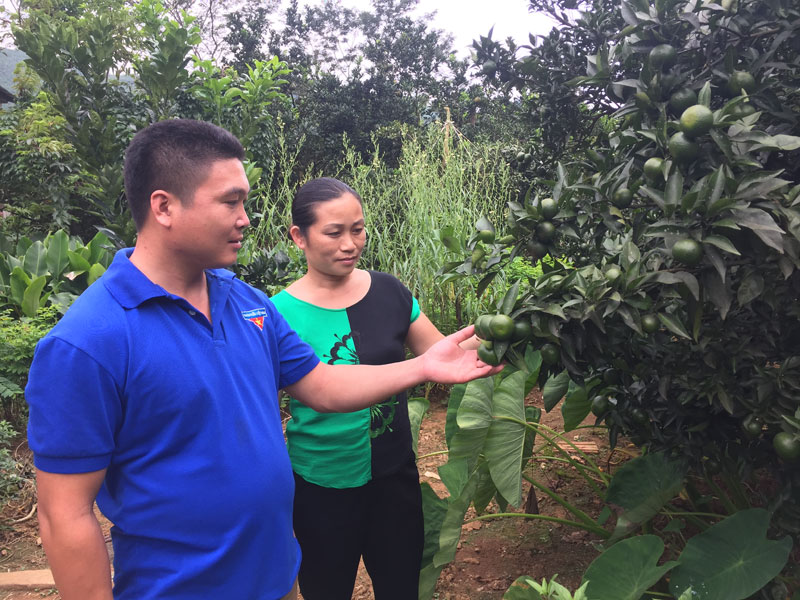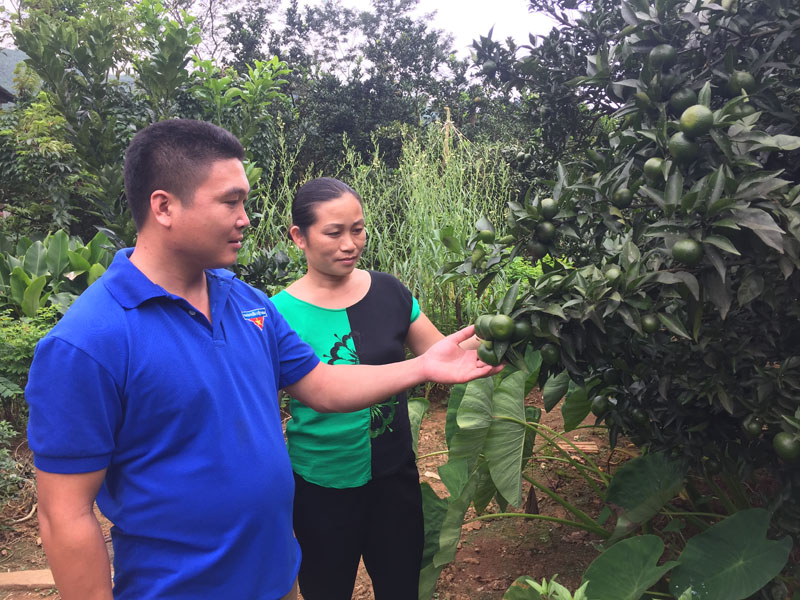
(HBO) – Implementing the national target programme on building new-style rural area, Cao Son commune in Da Bac district, northern mountainous Hoa Binh province, has to date achieved 11 out of 19 criteria. The commune has found it hard to fulfill criteria on income of local people and rate of poor households.
Cao Son commune’s per capita
income now stands at 22.6 million VND per year, while its rate of poor
households is 36 percent, and its proportion of near-poor families is 25.51
percent. Therefore, local authorities are working to raise income of people and
promote the commune’s socio-economic development.

Cadres of Cao Son commune (Da Bac district) share experiences in
growing citrus fruits with the family of Dinh Thi Guong in Na Chieu hamlet.
According to statistics, the
commune has expanded plantation area for key crops such as maize by 550 ha and
of cannaceae by 350 ha. Citrus fruits are cultivated on 130 ha, of which more
than 40 ha are used for commercial purpose. The locality maintains its herd of
cattle and poultry at over 17,000 heads. Industrial and craft production has
received significant attention from the local authorities. The entire commune
has 100 production and business establishments, focusing on processing cannaceae,
and producing construction materials and wooden products.
We visited the family of Dinh Thi
Guong in Na Chieu hamlet, a pioneer in growing citrus fruits in the commune. To
date, her citrus fruit garden has been expanded to more than 6,000 sq. m with
400 orange trees. In 2017, her family sold 10 million tonnes of fruits and earned
nearly 300 million VND. Merchants to her garden were mainly from Hanoi and nearby areas.
To help needy households get
access to preferential loans, Cao Son commune has got the mandate from the Vietnam
Bank for Social Policies and the Vietnam Bank for Agriculture and Rural
Development, with total outstanding loans reaching 57 billion VND. Every year,
the local social education centre works with relevant organisations and sectors
to hold 3 – 4 training sessions on farming for local farmers.
According to data from the Hoa Binh Provincial Party Committee, the industrial production index for the first six months of 2025 is estimated to have increased by 20% compared to the same period last year. This marks the highest year-on-year growth rate for this period since 2020.
In the first six months of 2025, Hoa Binh province’s export turnover was estimated at 1.145 billion USD, marking an 18.11% increase compared to the same period in 2024. Import turnover was estimated at $ 804 million, a 17.15% increase, which helped the province maintain a positive trade balance.
The lives of the ethnic minority farmers in Tan Lac district have gradually improved thanks to the new directions in agricultural production. This is a testament to the collective strength fostered through the professional associations and groups implemented by various levels of the district’s Farmers’ Union.
With the motto the "product quality comes first,” after nearly one year of establishment and operation, Muong village’s Clean Food Agricultural and Commercial Cooperative, located in Cau Hamlet, Hung Son Commune (Kim Boi district), has launched reputable, high-quality agricultural products to the market that are well-received by consumers. The products such as Muong village’s pork sausage, salt-cured chicken, and salt-cured pork hocks have gradually carved out a place in the market and they are on the path to obtaining the OCOP certification.
In the past, the phrase "bumper harvest, rock-bottom prices" was a familiar refrain for Vietnamese farmers engaged in fragmented, small-scale agriculture. But today, a new spirit is emerging across rural areas of Hoa Binh province - one of collaboration, organisation, and collective economic models that provide a stable foundation for production.
Maintaining growing area codes and packing facility codes in accordance with regulations is a mandatory requirement for agricultural products to be eligible for export. Recently, the Department of Agriculture and Environment of Hoa Binh province has intensified technical supervision of designated farming areas and packing facilities to safeguard the "green passport" that enables its products to access international markets.



